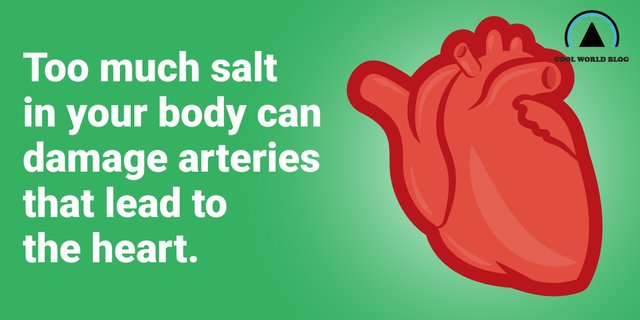Salt contains around 40% sodium, and 60% chloride. Salt is used to flavor foods and preserve them. Sodium, a vital mineral for nerve function and muscle health, is also found in salt. It works with chloride to maintain a healthy body's water and mineral balance.
-: Salt intake can have short-term consequences
Salt intake in excess can lead to short-term health problems.
- Water retention:
You may feel more bloated and puffy than normal. Your kidneys want to maintain a certain sodium-to-water ratio. Your kidneys retain extra water to compensate for sodium from your diet. This can lead to swelling in your hands and feet and may cause you to gain weight.
- Increase in blood pressure:
Salty foods can cause blood vessels to expand and blood flow to your arteries and blood vessels to increase. Although this may cause a temporary increase in blood pressure, it is not common for everyone to experience these effects.
Intense thirst:
Salty foods can cause dry mouth and thirst. Your body may also try to balance the sodium-to water ratio by encouraging you to drink. This can lead to more frequent urination. In contrast, hypernatremia, where your body's sodium levels rise beyond a safe level, can lead to water leaching out of your cells into your blood. https://coolworldblog01.blogspot.com/2022/08/what-happens-if-you-eat-too-much-salt.html
-: Salt intake can have long-term consequences
Salt intake over a prolonged period of time can lead to several health problems.
- May raise blood pressure:
Research shows that high salt diets can increase blood pressure. It is possible to lower blood pressure by lowering salt intake.
- May increase stomach-cancer risk:
Numerous studies have shown that a High-Salt Diet Is Linked To Higher Stomach Cancer risk.

-: Impact on heart disease and early death
However, some studies have shown that salt intakes can cause high blood pressure and stiffening of the blood vessels and arteries. These changes can lead to a higher chance of premature death and heart disease.
-: Is it possible for salt to be overdosed?
Salt overdoses can be fatal. They require salt consumption of 0.2 to 0.5 grams per pound (0.5-1g per kg) of bodyweight. For a person who weighs 154 pounds (70kg), this would be 35-70g (2-4 tablespoons) of salt.
-: What to do if salt is a problem?
First, ensure you are drinking enough water to replenish your body's sodium-to-water ratio. Second, you can try eating foods rich in potassium like fruits, vegetables and legumes. Potassium, along with sodium is an important nutrient in maintaining fluid balance